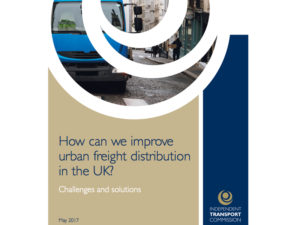Exploring new approaches such as retiming deliveries and deploying automated and electric vehicles is vital when it comes to overcoming urban freight distribution, according to a new report.

Published by the Independent Transport Commission, the research sets out a number of case studies on retiming, consolidation centres and the ‘last mile’. The DHL case study on retiming deliveries shows how a two-month trial with a particular customer in London brought financial benefits, while halving the number of delivery vehicles required, reducing complaints from local residents and improving safety.
Another case study on urban consolidation centres with the London Borough of Camden found there are a range of potential operational, economic, environmental and social benefits that can stem from the centres, including reduced traffic and environmental impacts, improved customer satisfaction, improved profitability, and improved land utilisation.
The research also look at Starship Technologies’ ‘last mile’ work with robot fleet trials – Starship hopes to launch a land-based delivery robot to a wider market, and aims to capture a substantial share of the last mile delivery market by 2021.
The report also identifies a number of principles that policymakers should use when addressing urban freight policy challenges and calls for more data on urban distribution and for more support for new technologies through pilot schemes and incentives.
The ITC will be sharing the report with the Department for Transport, all metro mayors, Transport of London (TfL), Transport for the North, Midland Connect and local authorities.
To access the ITC report, click here.

